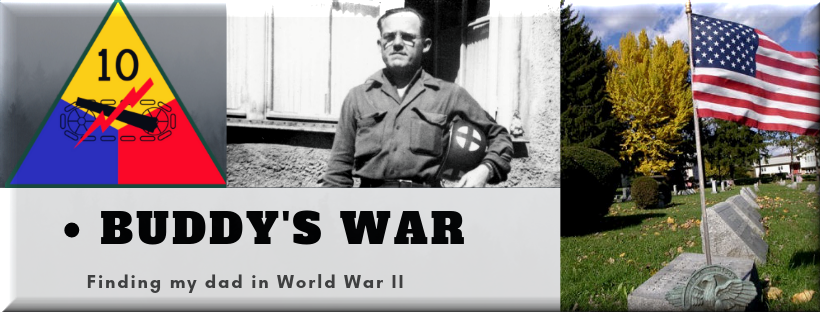New Year. It is a terrible day. It rained and snowed all day. Mabel and Carl came for dinner. Carl went back to Hornell on the train.• January 2, 1945
Got up at 11. Did not feel so good. Father is home. Wrote to Buddy and sent him a box of cigars.So far for Co. C and for most of the 10th Armored Division, the war has been moments of battle- and then waiting. Since the rush north in mid- December and then the return south to Metz, most of the 10th Armored has not been in battle.
Diary Entries, Beula Keller Lehman
• January 5, 1945
Got up at 10.30. Father went to work. Cleaned downstairs. It is not so cold today.From the 55th Armored Engineer Battalion (of the 10th Armored) After Action Report (AAR):
Diary, Beula Keller Lehman
The most outstanding characteristic of the operations in which the division was engaged was the impossibility of employing the armored elements off the roads. The soil and weather were such that armor booted down except on the top of hills, and often even there. Although this may seem to be a special case, experience both in the United States and in France indicates that operations on the roads are the rule rather than the exception. [Difficulty reading the next section, but it indicates that] until changes in tank design are made to reduce the ground pressure [to less than the] present 13 pounds per square inch, [this will be the case.]Another from the 55th AAR talked about an
engineer Lt standing on the front of a buttoned up medium tank, beating on the turret with a hammer, and trying to get the tanker to open up so that he could be told to move over for all engineer equipment to come forward past the column.The AAR, as was customary, ends with reflections on the action from a future planning view. It concludes that while this may have been a unique experience with Combat Commands as much as 50- 100 miles from HQ, they felt it was worth pointing out that many changes were
needed in equipment and operational methods, [it] has brought out very clearly the soundness of the basic training and of the basic doctrine. The principles are sound even though the means for accomplishing them need some revision.The 54th Armored Infantry Battalion of the 10 Armored AAR reviewed enemy action in mid-month at Bastogne:
When this battalion was committed the Germans winter counter offensive was at its peak. His aggressive high morale was evident on all sides. Employing tanks and infantry with occasional air support, he was able to push forward almost at will. His recklessness accounted for his losing heavily in armor and infantry. The recommendations here reflect the quickness in which decisions had to be made and ways to move more quickly such as wire men be included, more telephones be issued for gun platoons and not lowering the ratio of tanks to infantry.Two other recommendations indicate the distance issue again. With Combat Command B so far away from HQ and the Division support these two became obvious:
When operations where kitchens cannot support [the troops], one cook [should] be assigned to each platoon and that company [and] battalion maintenance stay within supporting distance.A number of AARs do report, very simply, that the particular battalion or platoon of the 10th Armored had no engagement with the enemy in January.
Even with the 80th Medical Battalion, I found no end of January AAR with hospital admissions and discharges since in the month there probably were few if any. The Company C morning reports indicated that they were involved in “organizational duties.” In February, that will change.
At the end of Bulge, these words of FDR from D-Day strike me. They are a fitting conclusion as well to the biggest battle the American troops faced in Europe.
The road will be long and hard. For the enemy is strong. He may hurl back our forces. Success may not come with rushing speed, but we shall return again and again; and we know that by Thy grace, and by the righteousness of our cause, our sons will triumph. They will be sore tried, by night and by day, without rest -- until the victory is won. The darkness will be rent by noise and flame. Men's souls will be shaken with the violences of war. For these men are lately drawn from the ways of peace. They fight not for the lust of conquest. They fight to end conquest. They fight to liberate. They fight to let justice arise, and tolerance and goodwill among all Thy people. They yearn but for the end of battle, for their return to the haven of home. Some will never return. Embrace these, Father, and receive them, Thy heroic servants, into Thy kingdom. ― Franklin D. Roosevelt• January 13, 1945
Got up at 10. Went to the store and it was awful icy. Did not do a darn thing all day. Today is Carl’s birthday.
Diary, Beula Keller Lehman
[Sidenote: I realized recently that I have not been posting excerpts from my grandmother Beula’s diaries except when they specifically relate to my Dad and Mom or the war. That does not give as full a view of life on the homefront as I would like. I will start doing that regularly.

No comments:
Post a Comment